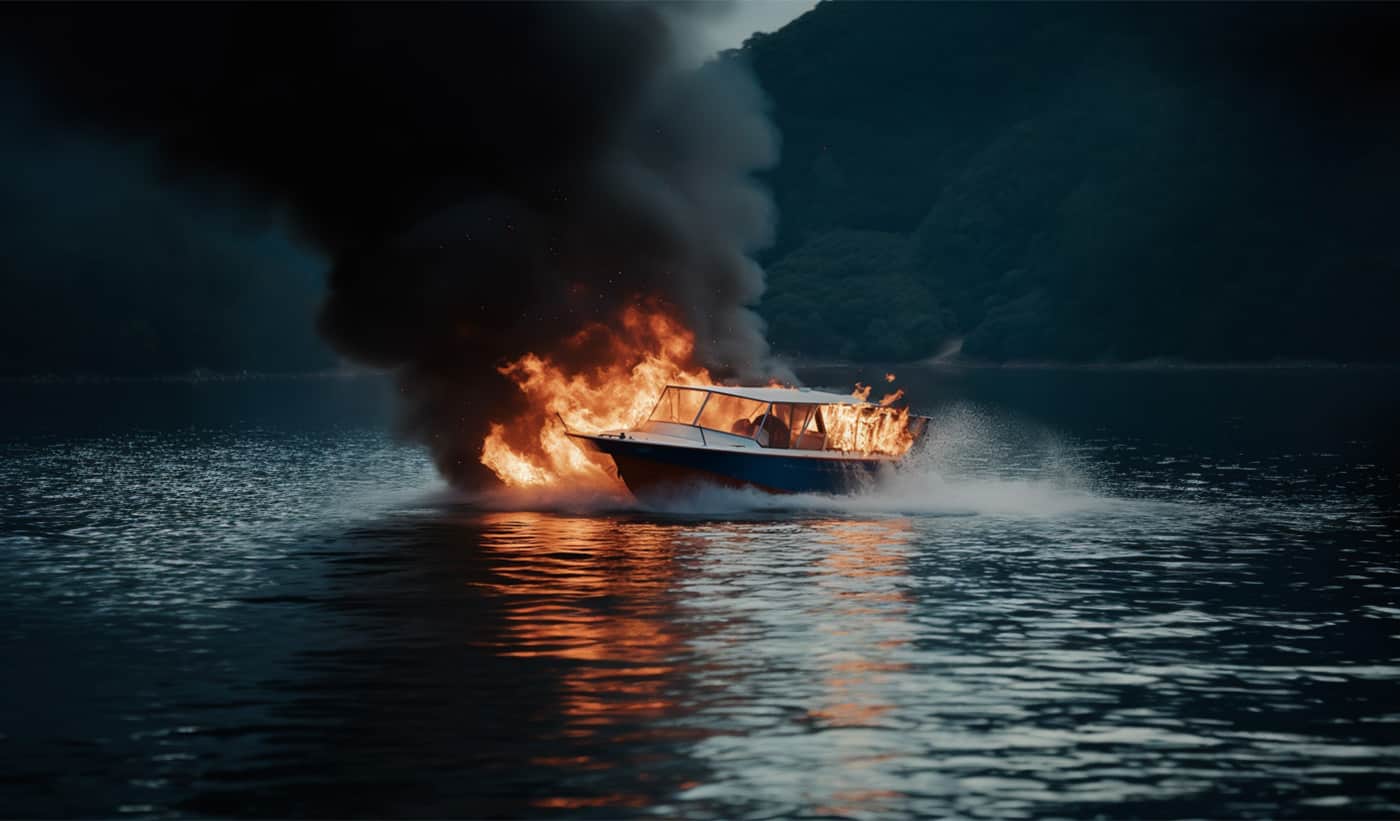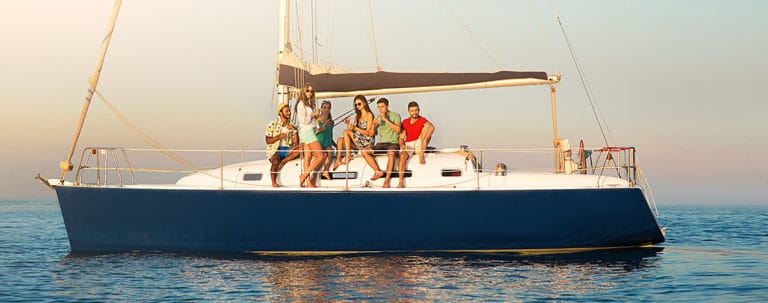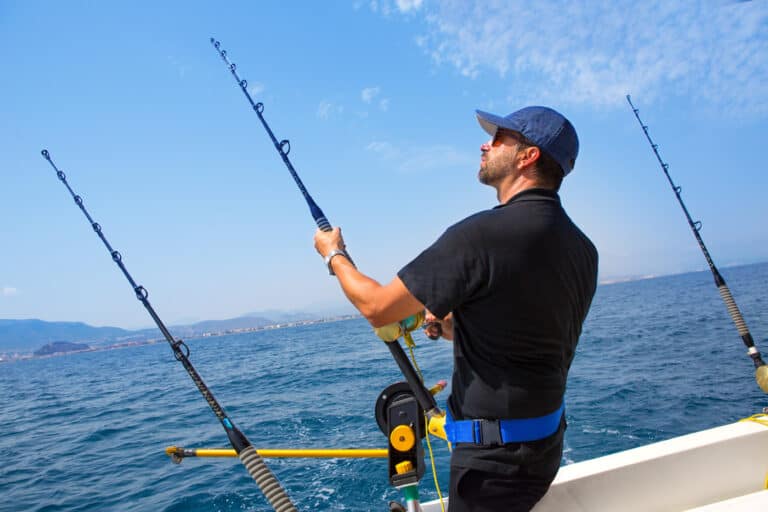You have had a lovely day out on the open seas, and you and the crew are preparing for a good night’s sleep.
All of a sudden you hear the blaring of the fire alarm onboard the ship and see flames coming from the back of your boat.
This is not a hugely common occurrence, but as a sailor, it is one that you should be prepared for.
Around one-fifth of all marine insurance claims are related to fires on board the boat.
What Should You Do If A Fire Breaks Out In The Back Of Your Boat?
If you are at sea and a fire breaks out (see what to do in case of a fire at the front of your boat too), the first thing you should do is to ensure all of the crew and passengers are wearing a personal flotation device.
An example of this is a lifejacket, in case the ship sinks.
Your next task is to angle the boat so that the fire is situated downwind.
This forces the smoke and flames to also travel downwind of the boat.
This will help to prevent any further damage being caused to the boat.
It also reduces your chances of smoke inhalation which can cause serious health issues.
When the fire is at the back of the boat, this means that you should head into the wind.
You should use a paddle to help keep the bow of the boat into the wind.
Check to see where the fire has originated from.
If it is in an area near to the engine then you should shut this off, as well as the fuel supply.
Grab a fire extinguisher and aim it at the base of the flames.
Squeeze the trigger and move the nozzle in a back and forth motion to try and suppress the flames.
This is known as the PASS method – Pull the pin, Aim at the base of the fire, Squeeze the handle, and Sweep the nozzle from side to side.
You should never use a water extinguisher on an electrical, grease, gasoline, or oil fire.
As someone is tackling the fire, get another crew member to summon help.
Use your VHF (very high frequency) marine radio to contact the coastguard for assistance.
What causes most boat fires?
There are 6 common causes of fires on boats.
These are the batteries, the engine, AC electrics, DC electrics, wiring harnesses, and off-boat sources.
Off-boat sources, as the name suggests, are things such as a storage container or marina catching fire.
This can then spread to the boat, causing it to go up in flames.
The fire may even start on someone else’s boat and spread to yours.
This means that all sailors should be prepared and trained in dealing with fires.
It does not only impact you, but fires can have a massive impact on those around you as well.
The wiring harnesses and starters inside your boat’s engine are particularly dangerous in older boats.
In boats that are older than 25 years, it is a good idea to check whether your engine contains the original starters and wiring harnesses.
If it does, we strongly advise replacing them with newer versions to ensure your safety.
If your engine is no longer in production, contact an electrical technician who will likely be able to sort a replacement for you.
Another common issue with older boats is the voltage regulator inside the battery.
After 10 years of usage, the failure rate increases dramatically and should be replaced.
This is one of the most common causes of fires on older boats.
You should also watch out for loose connections, chafed cables, and old battery switches.
One of the most common causes of battery-related fires on boats is due to operator error.
Take care that you are connecting the battery cables in the correct manner – in parallel or in series.
Make sure that you do not reverse the battery cables.
If you need to disconnect the battery, we suggest taking pictures of how the cables connect first.
It is a good idea to label the cables and potentially even mark the positive lug with red nail polish.
Many modern boats will come with the added luxury of AC appliances such as air conditioning, microwaves, and heaters.
These make living on a boat a much more enjoyable experience, but greatly increase the risk of an electrical fire breaking out on board.
To reduce the chances of this happening, it is recommended that you only use marine-grade power cords with appropriate adapters.
You should check these over regularly for any signs of wear and damage.
This is particularly important around the cord and blades of the plug.
Another high-risk area for electrical fires, especially on older boats, is the back of the shore power inlet.
This is where the terminals connect to the wiring of the ship.
If the cooling water in the engine is interrupted, then the engine can very easily overheat.
If it reaches high enough temperatures, a fire can break out.
Exhaust fires can also be caused by an old system or by a buildup of sediment collecting in the water supply.
Your impeller should be changed and replaced every other year at a minimum.
It should also be changed after your boat has grounded or has been sailed in very dirty water.
How can you prevent a fire on your boat?
One of the best ways to prevent fires on board a boat is to never allow oxygen, fuel, and heat to mix.
These are the key requirements for a fire to start and all 3 must be present.
Try to keep your fuel as far away as possible from heat sources.
You should regularly check the ventilation and fuel systems.
They should be installed correctly and have sustained no damage which would allow fuel to leak.
You should also regularly clean the systems to ensure there are no buildups of sediment which lead to blockages.
You should always follow safe fueling procedures when refilling your boat and keep the bilges clean at all times.




